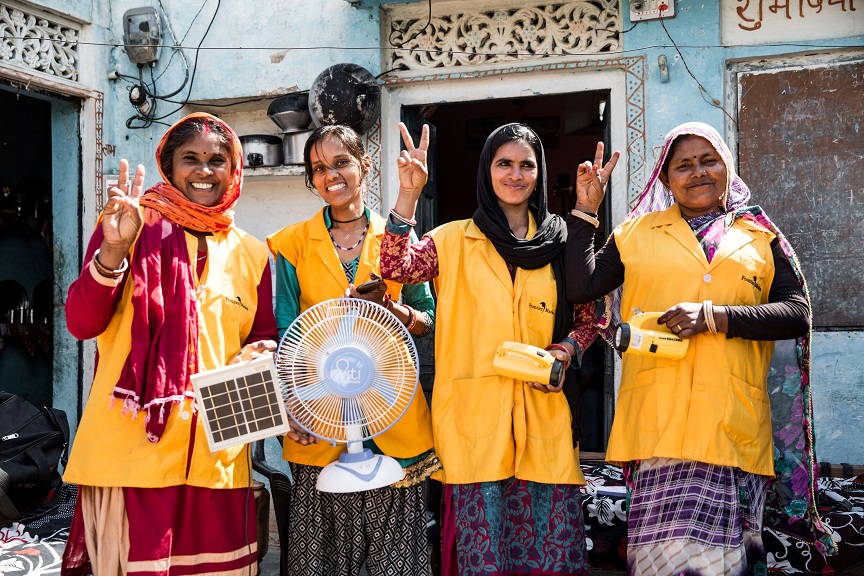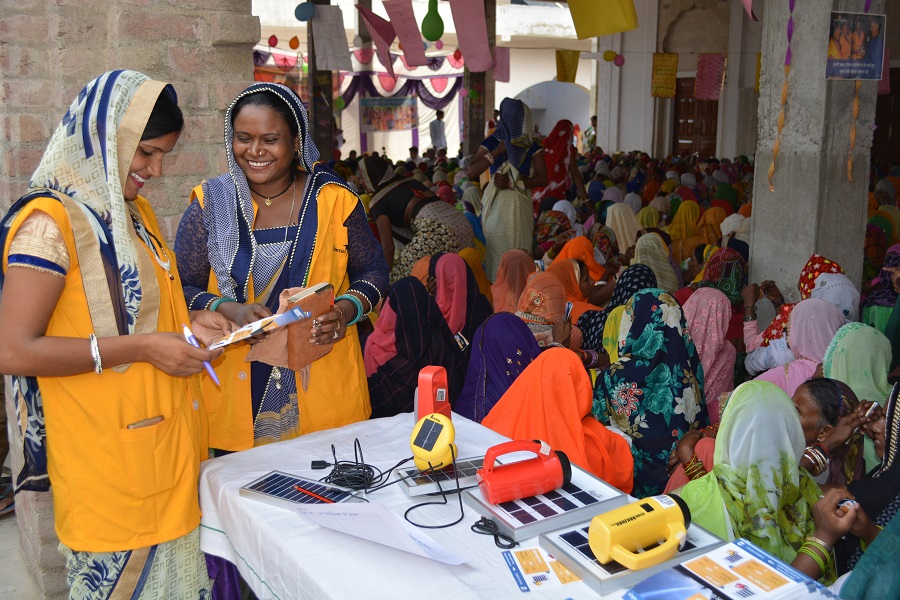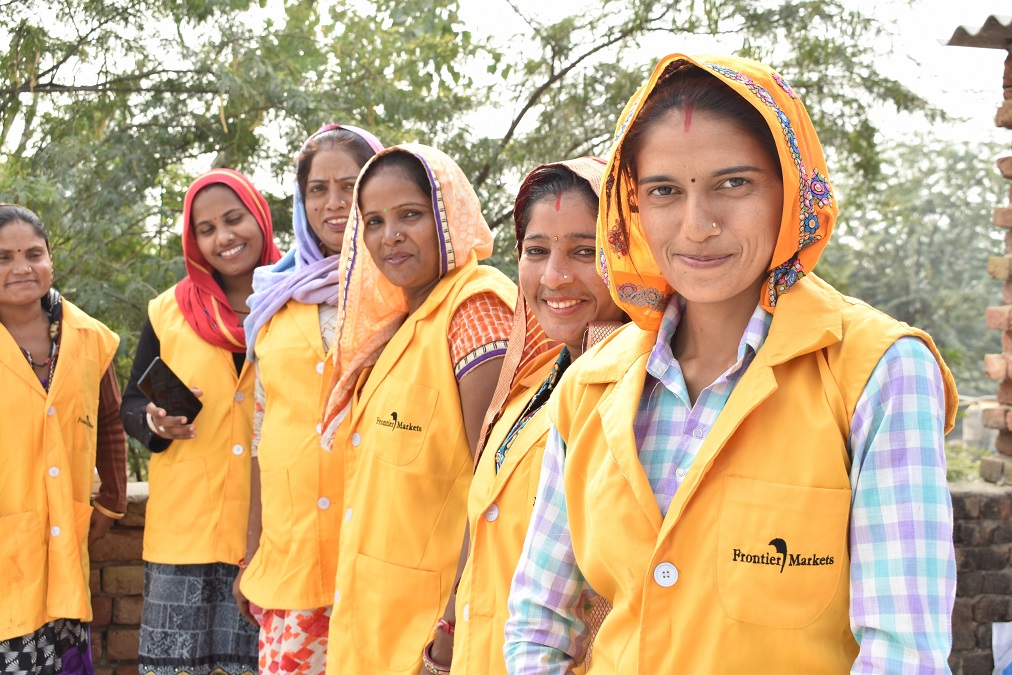Frontier Markets is a rural marketing, sales, and service distribution company providing access to affordable and quality clean energy solutions and appliances to low-income households in India by building a network of rural entrepreneurs.
What do you see as the main challenges faced by women entrepreneurs in securing funding for their small businesses in India?
We have experience in microfinance and working with rural women in India who are trying to build credible access to financing. Some of the core challenges include:
- No credit history
- No prior business experience
- No access to personal collaterals
- No access to funding network
Based on the above, either women get access to expensive financing (losing a lot of equity of their own company or expensive interest rates for loans), or they just miss the opportunity.
In order for women to build market access and prove business viability, they need startup funding – someone that can help them de-risk their business, provide them with skills and capabilities to manage challenging markets, and ultimately take a chance on their business ideas.
Another challenge is inherent biases in the system. People do not always want to invest in women founders because of this bias; that is one reason we have very few women founders. There is a stigma that has been associated with the company being at a loss when the woman gets married and so on. The stereotypical belief about women not being capable enough of building something of their own. The notion that if you are a woman, you're probably running your father's company or you're a pole standing with your husband is a difficult one to change, but as the founder of one of the largest rural women led social commerce platforms I am trying to break that stigma along with all other women in business.

You launched Frontier Markets, a last mile delivery service for durable goods, in 2011, but decided in 2015 to only employ women. Why the switch? What advantages do women have as sales agents?
In 2015, we partnered with an impact investor called Acumen Fund, who basically wanted us to look at a deeper impact assessment. For example, it's not enough to sell a solar lantern to a rural customer; we needed to know whether they were still using it or not and that the solution had longevity. When we did a third-party audit, we learned that 70 per cent of our users were women. This is when we had about 80,000 customers. It was the men who were actually buying it, but women were the users. When we started calling and asking them “How is the product? Are you still using it?” the men admitted, “My daughter, my wife, and my mother use it.”
The second we started talking to the women, we were getting these phenomenal insights into what the products had done to improve their own daily lives and more. These rich insights we were missing out on because our supply chain had stopped getting real inputs. The real feedback was coming from women, because they were our real customers.
Women have different insights, and that helped us change behavior faster, and that is when the Saral Jeevan Saheli concept kind of unfolded. We decided to become a hundred percent women's sales force from then onwards. Based on the insights that we were getting from these women, we learned that some of the products we were introducing were still very subpar in terms of their relevant use. Women told us what exactly was needed. They kept saying, we need this and that. When you are working with the customers themselves, you get brilliant insights.
Coming to your second part of the question, “What advantages do women have as sales agents?” The network of women in rural India is very strong and deep in the most remote areas. Women are the most social members of the family. They keep track of their surroundings keenly, which helps us with real data from their community. Their convincing power to sell a product is also much higher in rural areas due to their better understanding of the customer. When a woman is contributing to the economic wellbeing of her family it empowers her role in a society, family and the ecosystem. She gets power from the decision-making agency. So, when women become financially independent they also become empowered in many ways. The power of a Saheli is that she can go into anybody's house and can even have that awkward conversation about anything and everything without offending.

You also pivoted during Covid-19 to also provide essential goods and financial services. Why are financial services in rural areas crucial during the pandemic?
During the global crisis of the Covid-19 pandemic, followed by a country wide lockdown, rural India suffered the most. With disrupted supply chains, all stores were empty, people lost jobs and a lot more. Due to disruptions in cash flow, financial services played a crucial role during the pandemic. It was in 2016 when the demonetization took place and Frontier Markets as a company first adopted digital finance. Financial services since then have been a part of our offerings. We have partnered with several brands in rural India for financial services before and during the pandemic. While people lost their day jobs and their everyday livelihood was at stake, people’s only hope were these financial services from various organisations working in rural India.
Frontier Markets has been the pipe extension to all the fintech companies who want to finance the next half a billion customer base, which is our customer base. Most of these fintech companies don't know what kind of loan they need, how they're going to use it and how to do the credit scoring. This is where Frontier Markets comes in. We connect end-to-end service providers to rural customers in need.
Frontier Markets raised $2.25 million in financing last year. Can you tell us more about the challenges you faced in fundraising and how you were able to be successful?
We raised USD 2.25MN pre-series A funding in July 2020 led by ENGIE Rassembleurs d'Energies, The Rise Fund, and The Singh Family Trusts (advised by Artha Impact), along with Teja Ventures and affiliates of Beyond Capital Fund. We have a total funding of USD 4MN till date. The Company will soon be announcing its Series A round.
Initially, most investors would question my eligibility to pitch the company. They would ask questions like if I was married; questions that had nothing to do with my business. All of this didn't let me down, I believed in myself and my business. I reached out to people with similar mission and vision, investors who understood my business.
How have the challenges you have faced influenced the financing options you are providing to rural women?
As an advocate for women led, transformational leadership, I have always believed in empowering women around me, and rural women being in need the most will maximise the impact. I have believed in individual empowerment and independence. Financial independence for women has always empowered them the most. For me the injustice always came from poverty and it addressed inequality, addressing economic justice. I wanted to do my bit to impact the most where it's needed.
I have spent a lot of time investing in women upfront – leveraging our capital to build their capacity, provide them access to opportunities, and build their business acumen. Through their hard work and access to data, we build credibility – enabling us to connect them to financing partners by building their track record.

What advice do you have for female entrepreneurs who are just starting out and looking to finance their business?
My mantra is “Investing in women is smart business and key to poverty alleviation at scale.”
As an advocate for women led, transformational leadership and rethinking how market based approaches and social innovation organizations can better design for scalable impact, I have recently crafted a ground breaking partnership between Frontier Markets and the award-winning, Barefoot College, to exemplify this vision. The partnership will revolutionise last mile energy access, empowering rural women to become solar entrepreneurs and bring clean light to their communities.
I have shared knowledge and experience with youth, organizations, and forums for over a decade. I speak frequently at global summits set up by the International Finance Corporation, World Bank, United Nations, and investment communities to provide an entrepreneurial perspective to address SDGs 5 and 7, to reframe thinking about the next level of evolution regarding gender and energy access.
I would suggest, “Trust in yourself; rely on your peers and mentors; believe in your team. Dream big, be stubborn and chase your vision.”